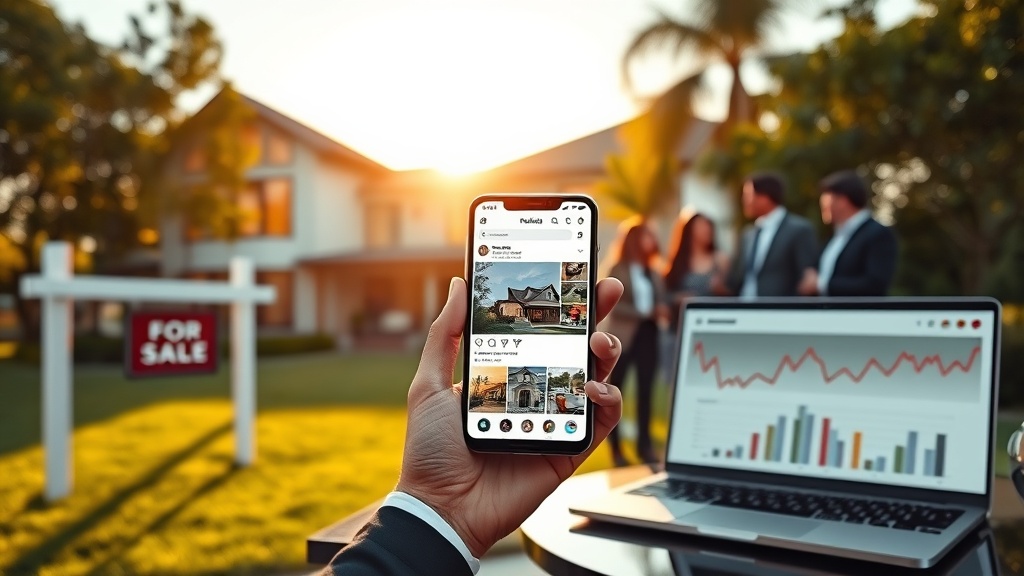The Ultimate Guide to Boosting Your Real Estate Business Through Social Media Marketing

" "
Hello there, fellow real estate enthusiasts! Are you ready to take your real estate business to the next level using the power of social media? Whether you’re a seasoned agent or just starting out, social media offers a treasure trove of opportunities to connect with potential buyers and sellers, showcase your properties, and build a recognizable brand. Let’s dive into how you can effectively harness this dynamic tool to boost your real estate business.
The Historical Context: The Evolution of Real Estate Marketing
Before the advent of social media, real estate marketing was heavily reliant on traditional methods such as newspaper ads, billboards, direct mail, and open houses. While these methods still have their place, the digital age has transformed the landscape. The internet became a game-changer, providing a platform for listings to reach a broader audience.
Social media, which began as a means for personal connection, quickly evolved into a powerful marketing tool. Platforms like Facebook, Instagram, and LinkedIn offer unique opportunities for real estate professionals to connect with clients in a more personal and engaging way.
Understanding the Social Media Landscape
1. Facebook: The Community Builder
Why Facebook?
With over 2.8 billion monthly active users, Facebook remains a cornerstone for social media marketing. Its diverse user base makes it an ideal platform for reaching potential buyers and sellers.
Real-World Scenario:
Imagine hosting a virtual open house on Facebook Live. You can walk potential buyers through a property in real-time, answer questions, and provide insights on the neighborhood—all from the comfort of your office. This not only saves time but also broadens your reach far beyond the local community.
Best Practices:
- Create a Business Page: This is your hub for all listings, updates, and client interactions.
- Use Targeted Ads: Facebook's robust targeting tools allow you to reach specific demographics, making your ad spend more efficient.
- Engage with Your Audience: Respond to comments and messages promptly to build trust and rapport.
2. Instagram: The Visual Storyteller
Why Instagram?
Real estate is a visual industry, and Instagram’s focus on images and short videos makes it a perfect match. With over 1 billion users, it’s a platform you can’t afford to ignore.
Real-World Scenario:
Consider using Instagram Stories to give a day-in-the-life view of a neighborhood. Highlight local amenities, schools, parks, and businesses that make the area attractive. This not only sells the property but the lifestyle as well.
Best Practices:
- Optimize Your Profile: Ensure your bio clearly states who you are and what you offer, complete with a link to your website.
- Utilize Hashtags: Use relevant hashtags to increase the discoverability of your posts.
- Leverage IGTV and Reels: Longer videos and short, engaging clips can showcase properties and market updates effectively.
3. LinkedIn: The Professional Networker
Why LinkedIn?
LinkedIn is known for its professional user base, making it an excellent platform for networking with other real estate professionals and potential clients in the corporate sector.
Real-World Scenario:
Share industry insights, market trends, and professional accomplishments. Position yourself as a thought leader in the real estate industry, and connect with other professionals who might need your services for corporate relocations or investment properties.
Best Practices:
- Publish Articles: Use LinkedIn’s publishing platform to share detailed posts on market trends and insights.
- Join Groups: Participate in real estate groups to engage with like-minded professionals.
- Regular Updates: Keep your network informed with regular posts about your latest listings and market news.
Crafting a Social Media Strategy
1. Define Your Goals
Before jumping into the world of social media, it’s crucial to have clear goals. Are you looking to increase brand awareness, generate leads, or improve customer engagement? Defining your objectives will guide your content strategy and help measure success.
2. Know Your Audience
Understanding your audience is key to creating content that resonates. Consider factors like age, location, buying behavior, and interests. Tools like Facebook Insights and Instagram Analytics can provide valuable data to help refine your approach.
3. Content is King
Your content should be engaging, informative, and tailored to your audience. Here are some content ideas to get you started:
- Property Showcases: High-quality images and videos of your listings.
- Market Updates: Share the latest trends and insights.
- Success Stories: Highlight client testimonials and successful transactions.
- Behind-the-Scenes: Give a glimpse into your daily life as a real estate agent.
4. Consistency is Key
Regular posting keeps your audience engaged and your brand top-of-mind. Create a content calendar to plan and schedule your posts in advance. This will help in maintaining a consistent presence without overwhelming your audience.
5. Engage and Interact
Social media is a two-way street. Encourage interactions by asking questions, responding to comments, and engaging with your audience’s content. This builds community and fosters long-term relationships.
Current Trends in Social Media Marketing
1. Video Content
Video continues to dominate social media, and for good reason. It’s engaging, easily digestible, and highly shareable. Platforms like TikTok have popularized short-form video content, while Facebook and Instagram Live offer real-time interaction.
2. Influencer Partnerships
Partnering with local influencers can expand your reach and lend credibility to your brand. Influencers can showcase your properties to their followers, effectively word-of-mouth marketing in the digital age.
3. Virtual and Augmented Reality
With advancements in technology, virtual tours and augmented reality (AR) experiences are becoming more accessible. These tools allow potential buyers to explore properties in a 3D environment, providing a more immersive experience.
4. Chatbots and AI
Automating responses through chatbots on platforms like Facebook Messenger can enhance customer service and streamline inquiries, allowing you to focus on closing deals.
Future Implications: The Road Ahead
As technology continues to evolve, so will the ways in which we use social media for real estate marketing. Here are some potential future implications:
1. Increased Personalization
As data analytics become more sophisticated, expect to see hyper-personalized content that caters to individual preferences and behaviors. This will enhance user experience and improve conversion rates.
2. More Integrated Platforms
The lines between different social media platforms will continue to blur, offering more integrated and seamless user experiences. This could lead to new marketing opportunities and strategies.
3. The Rise of Niche Platforms
While Facebook and Instagram remain dominant, niche platforms tailored to specific audiences will likely emerge. These platforms can offer more targeted marketing opportunities for real estate professionals.
Conclusion: Embrace the Power of Social Media
In conclusion, social media marketing is no longer optional for real estate professionals—it’s essential. By understanding the unique strengths of each platform, crafting a strategic approach, and staying abreast of current trends, you can significantly boost your real estate business.
Remember, the key to success on social media is authenticity. Be genuine, provide value, and build relationships. Your audience will appreciate it, and your business will thrive as a result. So, gear up, dive into the world of social media, and watch your real estate business soar to new heights!
Happy posting, and here’s to your success in the digital world of real estate!











